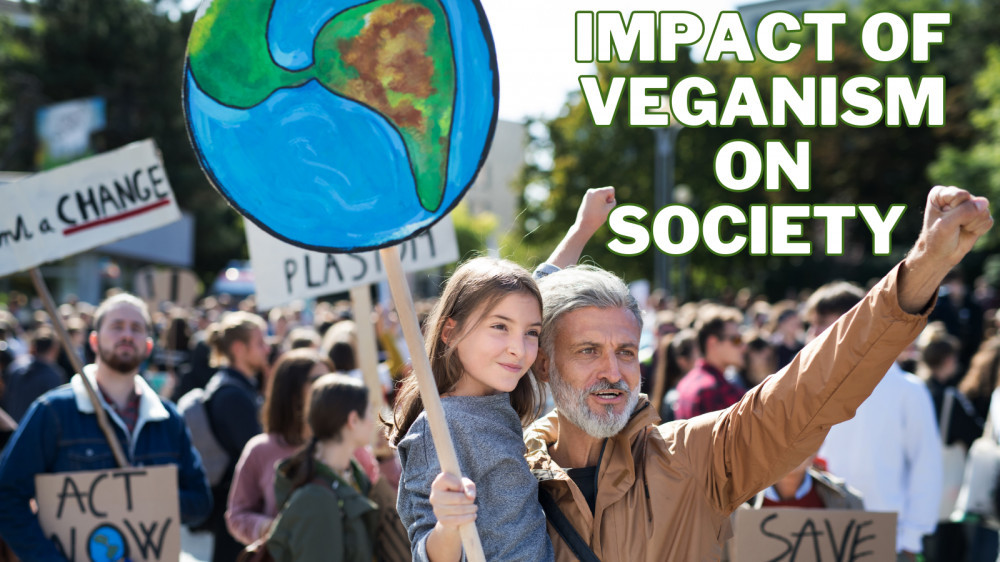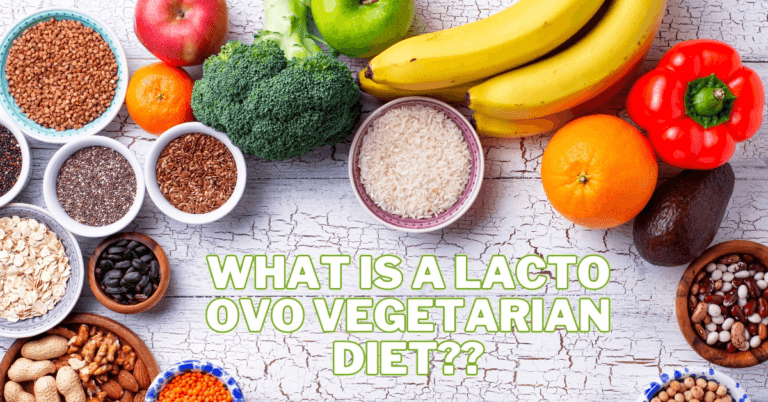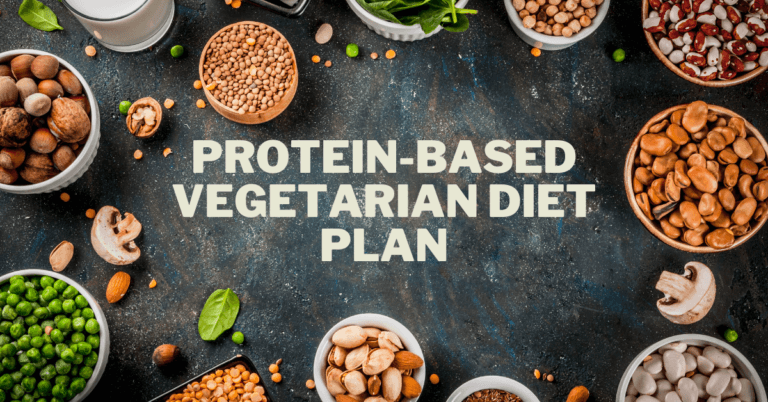Impact Of Veganism On Society
Impact Of Veganism On Society
In recent years, veganism has sparked a significant shift in societal norms, challenging long-standing dietary and lifestyle choices.
As a philosophy and lifestyle, veganism goes beyond mere dietary preferences and encompasses a profound commitment to compassion for animals, environmental sustainability, and personal well-being.
This article explores the multifaceted impact of veganism on society, examining its effects on individual health, animal welfare, ecological sustainability, and the economy.

What Is Veganism?
Veganism is a lifestyle and dietary choice that seeks to exclude the use of animals for food, clothing, or any other purpose.
It is rooted in the ethical belief that animals have the right to be treated compassionately and should not be exploited or harmed for human gain.
Veganism extends beyond avoiding meat and dairy products and promotes the consumption of plant-based foods derived solely from plant sources.
At the core of veganism is the adoption of a plant-based diet. This means consuming fruits, vegetables, grains, legumes, nuts, and seeds as the primary sources of nutrition.
Plant-based diets are rich in fiber, vitamins, minerals, and antioxidants and can provide all the necessary nutrients for a healthy and balanced lifestyle.
Vegans often rely on substitutes for animal-based products, such as tofu, tempeh, seitan, plant-based milk, and cheeses, to meet their nutritional needs.
Animal welfare is a central tenet of veganism. Vegans reject using animals for food, clothing, entertainment, or other purposes.
They advocate for all animals' fair treatment and ethical consideration, believing they are sentient beings capable of experiencing pain, pleasure, and emotions.
By abstaining from animal products, vegans aim to reduce the demand for industries contributing to animal suffering, such as factory farming, fur production, and animal testing.
Veganism also addresses the environmental impact of animal agriculture. Livestock production significantly contributes to deforestation, water pollution, greenhouse gas emissions, and climate change.
Vegans aim to minimize their ecological footprint and promote sustainable practices by choosing plant-based alternatives.
Plant-based diets require fewer resources, such as land, water, and energy, and have a lower carbon footprint than animal-based diets. Embracing veganism can help mitigate environmental degradation and preserve natural resources.
A well-planned vegan diet can offer numerous health benefits. Plant-based foods are typically lower in saturated fat and cholesterol and higher in fiber, antioxidants, and phytochemicals.
Studies have shown that vegans have lower risks of developing heart disease, high blood pressure, type 2 diabetes, obesity, and certain types of cancer.
However, through fortified foods or supplements, vegans must obtain adequate nutrients such as vitamin B12, iron, calcium, and omega-3 fatty acids.
Veganism has gained significant traction in society, with an increasing number of people adopting the lifestyle. This has led to a vibrant vegan community that shares recipes, resources, and support networks.
Veganism has also influenced mainstream culture, leading to the availability of plant-based options in restaurants, cafes, and grocery stores.
The movement has sparked conversations about ethics, sustainability, and personal choices, challenging societal norms and promoting dialogue about the treatment of animals and our responsibility towards the environment.
Impact Of Veganism On Society
The impact of veganism on society encompasses various dimensions, including health, animal welfare, environmental sustainability, and cultural shifts. Here are some details on the impact of veganism in these areas:

1. Health
Promoting a plant-based diet through veganism is linked to several health advantages.
A well-planned vegan diet focuses on fruits, vegetables, whole grains, legumes, and nuts, rich in essential nutrients, fiber, antioxidants, and phytochemicals.
Studies have consistently shown that vegan diets can help lower the risk of chronic diseases. Heart disease, one of the leading causes of death worldwide, can be mitigated by adopting a vegan lifestyle.
Plant-based diets are low in saturated fats and cholesterol and high in fiber and antioxidants, which can help reduce cholesterol levels, lower blood pressure, and improve overall cardiovascular health.
Type 2 diabetes, a condition often associated with unhealthy eating habits, can be prevented or managed through a vegan diet.
Plant-based diets are typically low in processed sugars and refined carbohydrates, which can help regulate blood sugar levels and improve insulin sensitivity.
A vegan lifestyle can help people who struggle with obesity, another major health issue. Plant-based diets tend to lower calorie density while providing essential nutrients, which can contribute to weight loss and weight management.
The high fiber content of plant-based foods also promotes satiety, reducing the likelihood of overeating.

2. Animal Welfare
Veganism is deeply rooted in compassion for animals. Individuals actively contribute to reducing the demand for animal products derived from factory farming and other practices that may involve cruelty and suffering by choosing a vegan lifestyle.
Veganism's growing popularity has increased awareness about animal rights and welfare issues. This, in turn, has influenced companies to develop and promote cruelty-free alternatives, such as plant-based meats and dairy substitutes, which are more widely available than ever before.

3. Environmental Sustainability
Animal agriculture significantly impacts the environment, including deforestation, greenhouse gas emissions, water pollution, and habitat destruction.
Veganism addresses these environmental concerns by promoting a more sustainable food system. Plant-based diets require fewer resources, including land, water, and energy, than animal-based diets.
By adopting vegan practices, individuals can reduce their carbon footprint, conserve natural resources, and contribute to mitigating climate change.

4. Cultural Shift
Veganism has sparked a cultural shift in societal norms and perspectives on food. The increasing number of individuals adopting veganism has increased plant-based food options in restaurants, cafes, and grocery stores.
The mainstream acceptance and availability of vegan products reflect the growing demand for cruelty-free alternatives. As veganism becomes more visible, it challenges traditional attitudes toward animals, food choices, and ethical considerations.
This cultural shift encourages dialogue and fosters a greater understanding of the interconnectedness between our food choices, personal values, and the well-being of animals and the environment.

5. Economic Impact
The rise of veganism has had a significant economic impact. The demand for plant-based products has created new market opportunities, leading to the growth of the vegan food industry.
As more individuals embrace veganism, there is increased investment in plant-based businesses, innovation in food technology, and job creation within the vegan sector.
This economic shift supports the development of a sustainable and compassionate economy that aligns with the changing consumer preferences.
6. Food System Transformation
Veganism challenges the dominant industrialized food system and encourages a shift towards more sustainable and ethical practices.
As more people choose plant-based diets, there is a growing demand for organic, locally sourced, and ethically produced foods.
This shift can lead to a diversification of farming practices, support for small-scale farmers, and the promotion of regenerative agriculture methods that prioritize soil health and biodiversity.

7. Influence On Policy And Legislation
The rise of veganism can potentially influence policy and legislation related to food and animal welfare. As public awareness and concern for animal rights and environmental issues increase, there is a greater push for stronger regulations on factory farming, animal cruelty, and the labelling of animal products.
Vegan advocacy groups and individuals actively lobby and support initiatives that promote more humane and sustainable practices within the food industry.

8. Social Justice And Intersectionality
Veganism encompasses a broader philosophy that recognizes the intersectionality of various social justice movements.
It acknowledges that different forms of oppression, such as speciesism, racism, sexism, ableism, and classism, are interconnected and rooted in systems of power and inequality.
By adopting a vegan lifestyle, individuals are encouraged to examine and challenge these interconnected systems of oppression.
Veganism promotes the belief that everyone deserves equal consideration and respect regardless of species. This understanding extends beyond animal rights to encompass human rights as well.
Veganism encourages individuals to critically evaluate the exploitation of both animals and humans within various industries, such as factory farming, clothing production, and labour-intensive sectors.
Moreover, veganism fosters dialogue and collaboration between different social justice movements. By recognizing the interconnectedness of struggles and promoting solidarity, veganism advocates for a more inclusive and equitable society.
It encourages individuals to consider how their choices and actions can contribute to a broader vision of social justice that addresses the systemic issues impacting both animals and humans.

9. Global Hunger And Food Security
Veganism has the potential to contribute to addressing global hunger and food security challenges by promoting sustainable and efficient food production methods.
Animal agriculture is resource-intensive, requiring large amounts of land, water, and feed to raise animals for meat, dairy, and eggs.
By shifting towards plant-based diets, fewer resources are needed to produce food, allowing for a more efficient allocation of resources.
A plant-based diet requires fewer land and water resources compared to animal agriculture. The land used to raise animals for food could be repurposed for growing crops directly for human consumption, thereby increasing food production capacity.
Additionally, the water footprint of plant-based foods is generally lower than that of animal products, conserving water resources and reducing strain on water-scarce regions.

10. Personal Empowerment And Conscious Living
Veganism empowers individuals to make conscious choices about their diet and lifestyle. By adopting a vegan lifestyle, individuals take control of their health, environmental impact, and ethical values.
This empowerment extends beyond food choices and can inspire individuals to explore other sustainable and compassionate practices in their daily lives, such as adopting eco-friendly habits, supporting ethical fashion, and minimizing waste.

11. Educational Opportunities
The growth of veganism has created educational opportunities for individuals to learn about plant-based nutrition, cooking, and sustainable living.
Cooking classes, workshops, and online resources provide accessible information and support for those interested in transitioning to a vegan lifestyle.
This educational aspect fosters a greater understanding of the benefits and impacts of veganism, encouraging more people to make informed choices and actively engage in conversations about food, health, and sustainability.

12. Positive Influence On Future Generations
Veganism has a generational impact as more young people embrace the lifestyle and advocate for animal rights and environmental protection.
The influence of veganism on future generations can shape societal norms, consumer behaviour, and policy priorities.
As younger generations grow up with a greater emphasis on sustainability and compassion, the impact of veganism will likely continue to expand and evolve.

13. Innovation In Food Technology
The rise of veganism has sparked innovation in the food industry, developing new plant-based products and alternatives.
Companies invest in research and development to create vegan versions of traditional animal-based foods like burgers, cheeses, and desserts.
This innovation caters to the growing demand for vegan options and drives advancements in food technology, leading to more delicious and sustainable plant-based alternatives.

14. Reducing Antibiotic Resistance
Animal agriculture is a significant driver of antibiotic resistance, a growing global health concern. Antibiotics are often used in intensive farming practices to promote growth and prevent diseases in livestock.
However, the overuse and misuse of antibiotics in animal agriculture contribute to the development of antibiotic-resistant bacteria, which can spread to humans through direct contact, food consumption, or environmental contamination.
Veganism plays a role in reducing antibiotic resistance by reducing the demand for animal products. As more people adopt a vegan lifestyle, the demand for meat, dairy, and eggs decreases.
This, in turn, alleviates the pressure on the agricultural industry to rely on antibiotics to prevent and treat animal infections. By reducing the use of antibiotics in animal agriculture, veganism helps preserve the effectiveness of antibiotics for treating human infections.
Moreover, adopting a plant-based diet can also positively impact human health. Plant-based diets are typically rich in fruits, vegetables, whole grains, and legumes, which provide essential nutrients, fiber, and antioxidants.
A well-balanced vegan diet can support a strong immune system and overall health, reducing the need for antibiotics in individuals.

15. Positive Influence On Social Norms
Veganism can shape social norms and influence cultural perceptions of food choices. As more people adopt veganism and incorporate plant-based meals into their routines, it becomes increasingly normalized within society.
This normalization can reduce the stigma around veganism, making it more accessible and acceptable for individuals from diverse backgrounds to embrace a plant-based lifestyle.

16. Fostering Global Connections
The vegan movement transcends national boundaries and fosters global connections. Individuals from different countries and cultures can share their experiences, recipes, and knowledge through social media platforms, online communities, and vegan events.
This global network of vegans creates a sense of community and support, encouraging individuals to engage in dialogue, learn from one another, and work towards a shared vision of a sustainable and compassionate world.

17. Economic Savings In Healthcare
Adopting a plant-based diet can lead to long-term economic savings in healthcare. By reducing the risk of chronic diseases associated with poor dietary choices, such as heart disease, diabetes, and certain cancers, individuals who follow a vegan lifestyle may experience lower healthcare costs over time.
This can positively affect individuals and healthcare systems, allowing resources to be allocated more efficiently and promoting overall well-being.

18. Enhanced Biodiversity Conservation
Animal agriculture contributes to habitat destruction and biodiversity loss. By shifting towards plant-based diets, veganism promotes conservation efforts by reducing the demand for land for livestock farming and decreasing the pressure on natural ecosystems.
This, in turn, helps preserve habitats, protect endangered species, and maintain the delicate balance of biodiversity on our planet.

19. Influence On Fashion And Beauty Industries
Veganism has significantly influenced the fashion and beauty industries, driving the demand for cruelty-free and vegan-friendly products.
The ethical values associated with veganism have led to a shift away from using animal-derived materials like fur, leather, and silk in fashion.
As a result, alternative materials have emerged, such as plant-based fabrics like cotton, hemp, bamboo, and innovative materials like pineapple leather (Piñatex) and mushroom leather (MuSkin). These materials offer sustainable and animal-friendly alternatives to traditional animal-derived materials.
Similarly, in the beauty industry, veganism has prompted a demand for cosmetics and personal care products that are not tested on animals and do not contain animal-derived ingredients.

20. Ethical Consumerism
Veganism has profoundly impacted ethical consumerism, as individuals are increasingly mindful of the consequences of their choices on animals, the environment and their well-being.
This awareness extends beyond dietary preferences and influences various aspects of consumerism. In the fashion industry, the demand for cruelty-free alternatives to animal-derived materials has led to the emergence of vegan clothing brands and innovative plant-based fabrics.
Similarly, in personal care products, consumers seek out items that are not tested on animals and are free from animal-derived ingredients.
Household products have also seen a profound impact and environmentally-friendly options. Veganism's influence on entertainment and media has been notable, with documentaries and influential figures promoting the lifestyle.
This growing ethical consciousness has driven companies to reevaluate their practices and develop sustainable, animal-friendly alternatives in response to the rising demand for cruelty-free and vegan products.
Conclusion
In conclusion, veganism profoundly impacts society across multiple dimensions. It not only benefits individuals by promoting better health outcomes and reducing the risk of chronic diseases but also fosters compassion for animals and advocates for their rights.
Veganism addresses environmental concerns by mitigating the carbon footprint associated with animal agriculture and promoting sustainable food systems.
Moreover, it sparks cultural shifts by challenging traditional norms and encouraging dialogue about ethical considerations and food choices.
As the vegan movement continues gaining momentum, its impact on society will expand. The growing awareness and adoption of veganism contribute to a shift toward a more sustainable, compassionate, and harmonious future.
By embracing veganism, individuals play an active role in shaping a society that values health, environmental sustainability, animal welfare, and social justice.
Ultimately, the impact of veganism on society is profound and far-reaching, paving the way for a more compassionate, equitable, and sustainable world for present and future generations.
I trust you enjoyed this article about the Impact Of Veganism On Society. Please stay tuned for more blog posts to come shortly. Take care!
JeannetteZ
>>> Please click here to read my Vegan Travel Guides To World Destinations <<<
>>> Want To Learn How To Create Delicious, Cruelty-Free, Healthy AND 100% Vegan Meals? Try These Awesome Vegan Cooking Courses With A Free 7-DAY MEMBERSHIP<<<
Your Opinion Is Important To Me
Do you have thoughts, ideas, or questions? I would love to hear from you. Please leave me your questions, experiences, and remarks about the Impact Of Veganism On Society article in the comments section below. You can also reach me by email at Jeannette@LivingTheVeganLifestyle.org.
Disclosure
This post may contain affiliate links. I earn from qualifying purchases as an Amazon Associate and other affiliate programs. Please read my full disclosure.
Here are links to some of my favourite articles:
Best Vegan Desserts Without Sugar
Best Vegan Grocery Shopping List






